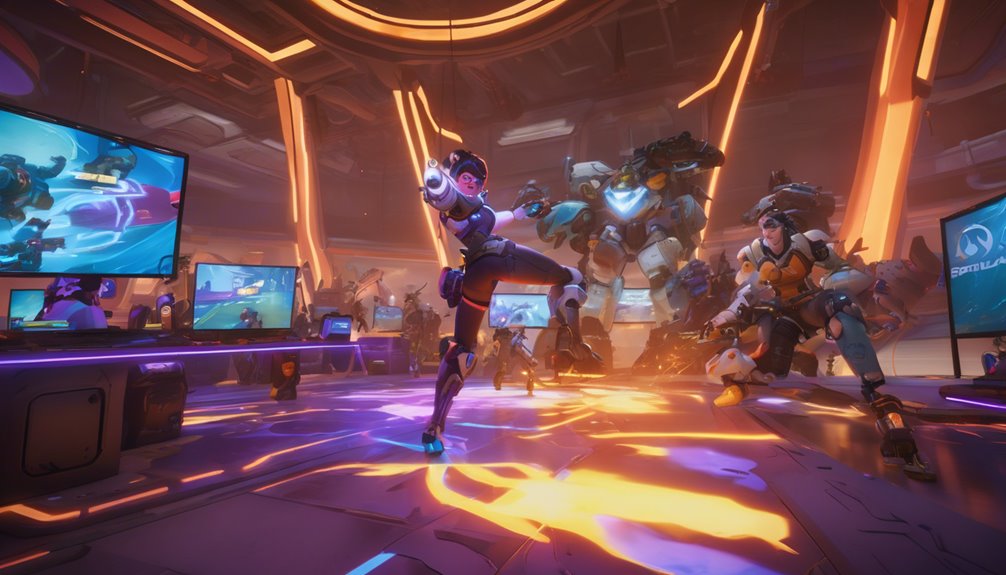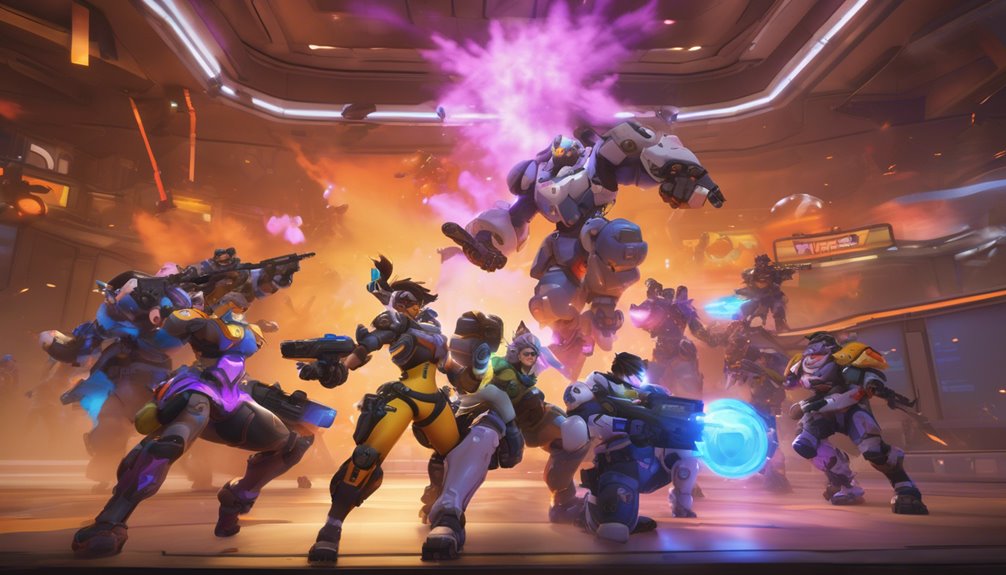Understanding Placement Matches: What They Are and Why They Matter
Have you ever wondered why placement matches are such a crucial part of your Overwatch experience?
 These matches function as your gateway into the game's ranking system, providing an initial assessment of your skill level. Each season, you'll engage in a series of placement match formats, typically consisting of five to ten games, which determine your starting rank.
These matches function as your gateway into the game's ranking system, providing an initial assessment of your skill level. Each season, you'll engage in a series of placement match formats, typically consisting of five to ten games, which determine your starting rank.
The outcomes of these matches directly influence your placement, aligning you with players of similar skill levels. This ensures that you face opponents who challenge you while also allowing for personal growth. The ranking system is designed to balance competition and promote fair gameplay, making placement matches essential for accurately gauging your abilities. Without this process, you might find yourself mismatched, leading to frustrating experiences that could hinder your enjoyment of the game. So, embracing placement matches is key to unlocking your true potential in Overwatch.
The Impact of Placement Matches on Your Skill Tier
While many players may underestimate the significance of placement matches, they play a pivotal role in determining your skill tier in Overwatch. These matches serve as a crucial skill evaluation tool, allowing the game to assess your abilities based on performance, teamwork, and adaptability. Your rank placement isn’t just a number; it represents your competitive capabilities and sets the stage for your journey in the game.
Winning or losing during placement can dramatically influence where you end up in the rankings. If you perform exceptionally well, you might find yourself placed higher than expected, while a poor showing could lead to a lower tier. This initial placement can impact your matchmaking experience, as you'll face opponents of similar skill levels. Therefore, treating these matches with the seriousness they deserve can significantly affect your overall experience and progression in Overwatch.
Strategies for Success in Placement Matches
To succeed in your placement matches, understanding team composition is crucial; it can make or break your chances of winning. Prioritize heroes that complement each other and adapt to your teammates' picks for a balanced lineup. Additionally, effective communication and coordination can significantly enhance your team's performance, ensuring everyone is on the same page and working toward a common goal.
Team Composition Importance
Team composition acts as the backbone of your success in Overwatch placement matches, influencing not only your team's synergy but also your overall strategy. Understanding the importance of team dynamics and role balance can significantly enhance your chances of winning. Here are some key points to consider:
- Diverse Roles: Ensure you have a mix of tanks, healers, and damage dealers.
- Counter Picks: Select heroes that counter your opponents' choices effectively.
- Synergistic Abilities: Choose heroes whose abilities complement each other.
- Flexibility: Be ready to adjust your picks based on team needs and enemy composition.
- Communication: While not the focus here, remember that discussing picks can lead to better team cohesion.
Mastering team composition can provide a solid foundation for success in your placement matches.
Communication and Coordination
Effective communication and coordination can make the difference between victory and defeat in Overwatch placement matches. To succeed, you need to engage with your teammates consistently. Use voice chat or text to share information about enemy positions, cooldowns, and ultimate statuses. Making strategic calls is crucial; if you spot an opportunity to initiate a team fight, don’t hesitate to communicate that clearly. Encourage your teammates to do the same—this fosters a proactive environment where everyone feels involved. Remember, it’s not just about relaying information; it's about timing and clarity. Practicing effective communication can lead to better coordination, ensuring that your team executes strategies smoothly. Ultimately, this synergy can elevate your performance during those critical placement matches.
Team Composition and Its Role in Placement Outcomes
When it comes to placement matches in Overwatch, team composition can make or break your success. Understanding the importance of synergy, being flexible in your role choices, and effectively countering the enemy's composition are crucial elements that can significantly influence your outcomes. By focusing on these aspects, you can improve your chances of securing a favorable placement.
Importance of Synergy
While individual skill plays a crucial role in Overwatch placement matches, the importance of synergy in team composition cannot be overstated. When players effectively coordinate their heroes, the synergy benefits become evident, enhancing overall team dynamics and increasing your chances of victory.
Consider these key aspects of synergy:
- Complementary Heroes: Choose heroes that enhance each other's abilities.
- Communication: Share strategies and callouts to maintain cohesion.
- Flexibility: Adapt your playstyle based on team needs and opponents.
- Focus Fire: Target enemies as a unit to secure eliminations quickly.
- Ultimate Coordination: Combine ultimates for devastating team fights.
Ultimately, fostering synergy leads to better coordination, making your placement matches more successful.
Flexibility in Roles
Flexibility in roles is essential for adapting to the ever-changing dynamics of Overwatch placement matches. When you demonstrate role adaptability, you not only enhance your chances of winning but also contribute to your team's overall synergy. Picking versatile heroes can make a significant difference in how your team performs. For instance, a DPS player who can switch to support when needed can fill crucial gaps in your team's composition. This adaptability allows you to respond to the evolving circumstances of each match, whether that means countering an aggressive enemy strategy or bolstering your defenses. By embracing the need for flexibility in roles, you're not just playing your part; you’re actively shaping the outcome of your placement matches.
Countering Enemy Composition
Understanding how to counter enemy compositions can be a game-changer in your placement matches. By analyzing your opponents’ enemy heroes and adjusting your team’s strategy, you can create effective composition counters that enhance team synergy. Here are some key approaches to consider:
- Identify enemy heroes: Recognize the strengths and weaknesses of their picks.
- Utilize counter picks: Choose heroes that directly counter their compositions.
- Implement adaptive strategies: Be ready to switch tactics based on match progression.
- Enhance hero flexibility: Play heroes that can fulfill multiple roles if needed.
- Conduct match analysis: Review previous games to understand what worked and what didn’t.
Analyzing Your Performance: Metrics to Consider
When evaluating your performance in Overwatch placement matches, several key metrics can provide valuable insights into your gameplay. Start by analyzing your kill/death ratio; it’s a straightforward indicator of how effectively you’re contributing to team fights. Next, consider your objective time—are you actively engaging with the objectives, or are you caught up in eliminations?
Another crucial performance metric is your healing or damage output, depending on your role. Are you meeting your improvement goals in these areas? Tracking these stats over multiple matches can reveal patterns, helping you pinpoint specific aspects of your gameplay that need work.
Finally, don’t forget to review your ult economy. Are you using your ultimate at the right moments? By focusing on these metrics, you can gain a clearer understanding of your strengths and weaknesses, ultimately leading to more effective strategies for your future placement matches.
Overcoming Common Challenges During Placement Matches
After assessing your performance metrics, you'll likely encounter various challenges during your placement matches that can hinder your progress. Understanding placement psychology is essential to navigating these hurdles and maintaining a healthy match mentality. Here are some common challenges you might face:
- Team Composition: Adapting to varying team dynamics can be difficult.
- Communication Issues: Miscommunication can lead to frustrating losses.
- Personal Expectations: High self-expectations might create unnecessary pressure.
- Tilt and Frustration: Emotional responses can cloud your judgment and gameplay.
- Inconsistent Matchmaking: Variability in skill levels among players can disrupt your flow.
Long-term Effects of Placement Matches on Your Ranked Journey
While placement matches may seem like a mere stepping stone in your ranked journey, their impact can resonate throughout your entire gaming experience. The placement psychology at play can set the tone for your performance and mindset. If you start strong, the confidence gained can carry through subsequent matches, reducing rank anxiety. Conversely, poor placements might haunt you, leading to self-doubt and a struggle to regain your footing.
The pressure you feel during those initial matches can shape your long-term attitude towards competitive play. If you find yourself fixating on the fear of losing rank, it can create a cycle of anxiety that hinders your gameplay. Understanding the psychological effects of placement matches can help you develop resilience. Embrace these early games as learning opportunities, allowing you to evolve rather than letting anxiety dictate your performance. Your rank journey isn’t just about numbers; it’s about growth and perseverance.
Frequently Asked Questions
Can I Play With Friends During Placement Matches?
Yes, you can play with friends during placement matches. Playing together can enhance your competitive strategy, allowing you to coordinate better and improve your chances of winning, making the experience more enjoyable and effective overall.
How Many Placement Matches Do I Need to Play?
You’ll need to play a total of five placement matches. Understanding the placement match criteria and ranking system nuances will help you strategize for a better rank, making each match crucial for your overall performance.
Do Losses in Placement Matches Affect My Overall Rank?
Yes, losses in placement matches can affect your overall rank. To maintain competitive integrity, rank decay might occur if you're consistently losing, impacting your placement. It's crucial to perform well to secure a favorable starting position.
Are Placement Matches the Same for All Game Modes?
Placement matches aren’t the same across all game modes. Competitive ranking varies due to game mode differences, impacting how your skill is assessed. Each mode has unique requirements, so your experience may differ significantly.
Can I Change Heroes During Placement Matches?
Yes, you can change heroes during placement matches. Hero switching is essential for adapting your match strategy, responding to your team’s needs, and countering opponents effectively. Flexibility can significantly influence your overall performance and placement outcome.

